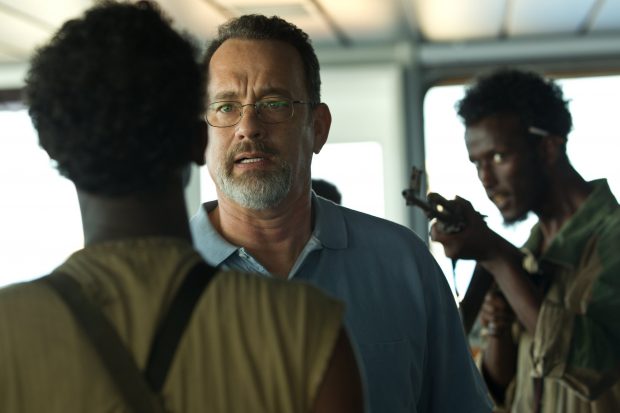Movie Review
‘Captain Phillips’ brings intensity and empathy to incredible true story of heroism
Tom Hanks, center, stars in Columbia Pictures' "Captain Phillips."
“Captain Phillips” is based on the true story of Richard Phillips, the eponymous captain who was chartering the Maersk Alabama container ship when it was hijacked by Somali pirates in 2009. The pirates held Phillips hostage on a tiny lifeboat for four days until the US Navy was finally able to intervene.
At first glance, it may seem like “Captain Phillips” hinges on the star power of Tom Hanks, who plays Phillips. And yes, Hanks’ performance is as fantastic as ever. The two-time Academy Award winner really captures Phillips’ quiet heroism—in his willingness to sacrifice himself for his crew and his remarkable ability to keep a level head throughout the ordeal—while still keeping the character very human and relatable. (He even nails Phillips’ Boston accent.) Much of the story’s emotionality comes from Hanks’ performance, particularly in the film’s gut-wrenching final scene. Not surprisingly, Hanks is already getting Oscar buzz for the role.
But Hanks can’t get all the credit for the movie’s success. Director Paul Greengrass (“The Bourne Ultimatum”) has crafted a dizzyingly intense thriller that will leave you on the edge of your seat for the full 134 minutes. Somehow, even the most innocuous scenes are suspenseful, like when Phillips thoroughly inspects the ship before leaving port in Oman. (Side note: one of my only criticisms of this movie is that Phillips sometimes comes across as a bit of a know-it-all, as if he’s the only one taking the threat of piracy seriously.) The cinematography will also put you right in the moment, perhaps even making you feel a bit seasick.
The filmmakers’ decision to cast Somali-American actors as the four main pirates adds to the film’s realism. Even though Barkhad Abdi, Faysal Ahmed, Barkhad Abdirahman and Mahat Ali are all first-time actors, they bring an unbelievable amount of sincerity to their respective roles. Abdi in particular has been getting his fair share of Oscar buzz for his role as Muse, the pirates’ ringleader. Abdi’s Muse is at once terrifying and naïve, making it surprisingly easy to empathize with him. In fact, all four actors do an excellent job humanizing the villains, to the point where you almost don’t want to see their downfall at the end of the film.
This sort of complexity is one of the film’s biggest triumphs. “Captain Phillips” easily could have been a straightforward action thriller about a hero who takes down pirates. Instead, the film gets to the root of the problem, exploring the dire situations that lead young men like Muse into a life of piracy. Snippets of revealing dialogue and shots of the pirates’ desolate Somali homeland convey that the men have turned to piracy out of sheer desperation. “Captain Phillips” is one of the most intense, action-packed movies of the season, but it’s also a deeply moving and thought-provoking film that will leave you emotionally drained by the closing credits.

